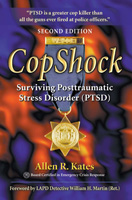
CopShock: Second Edition
Surviving Posttraumatic Stress Disorder (PTSD)
by Allen R. Kates, MFAW, BCECR
Eating Disorders
When experiencing the aftermath of
psychological trauma, police officers sometimes stop eating, overeat or binge
eat and then purge. They are like alcoholics trying to deaden the pain in order
to cope with life. More than 8 million Americans have eating disorders:
7,000,000 women and 1,000,000 men. Here are a few of the many sources on the web
that offer explanation and help.
Eating-Disorder.com
This website defines
eating disorders, but primarily offers ways to find treatment centers. To find
treatment centers in the United States, call: 866-575-8179.
Go to:
http://www.eating-disorder.com.
Internet Mental Health Net
(IMHN)
IMHN describes eating disorders as well as many other
disorders in detail, but a most interesting feature is that it allows for a
confidential self-diagnosis. For information on eating disorders, use the site’s
search engine by typing in key words such as “anorexia,” “bulimia,” and so
on.
Go to: http://mentalhealth.com.
Mirror
Mirror
This site provides information on signs and symptoms
of eating disorders, relapse warnings and prevention, getting help and choosing
a therapist. It features resources, a survivor’s wall and letters of hope as
well as discusses what family members can do and how they can cope with their
own feelings about the problem.
Go to: http://www.mirror-mirror.org.
National Eating Disorders
Association (NEDA)
NEDA is dedicated to increasing the
awareness and prevention of eating disorders. Among other things, the site
describes how to help a friend with an eating disorder, allows you to ask
questions from Ask An Expert, and includes videos, resources, a parent, family
and friends network, and information about their annual conference.
Go to:
http://www.nationaleatingdisorders.org. Write: NEDA, 603 Stewart Street, Suite 803, Seattle, WA 98101. Phone:
206-382-3587.
Something Fishy Website on
Eating Disorders
One of the oldest and largest sites on
eating disorders, “something fishy” includes treatment locations, online
support, signs and symptoms, physical dangers, vitamin deficiencies and managing
stress. It helps you find a therapist and even accommodates online therapy. In
English, Spanish, or French, the site offers many Internet and off-web listings
of eating disorder organizations in the United States and other countries.
Go to: http://www.something-fishy.com.